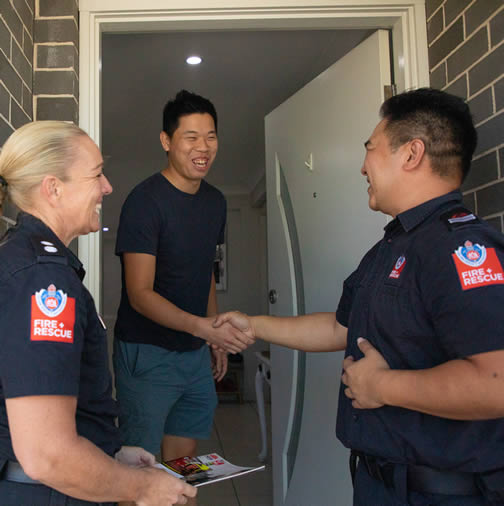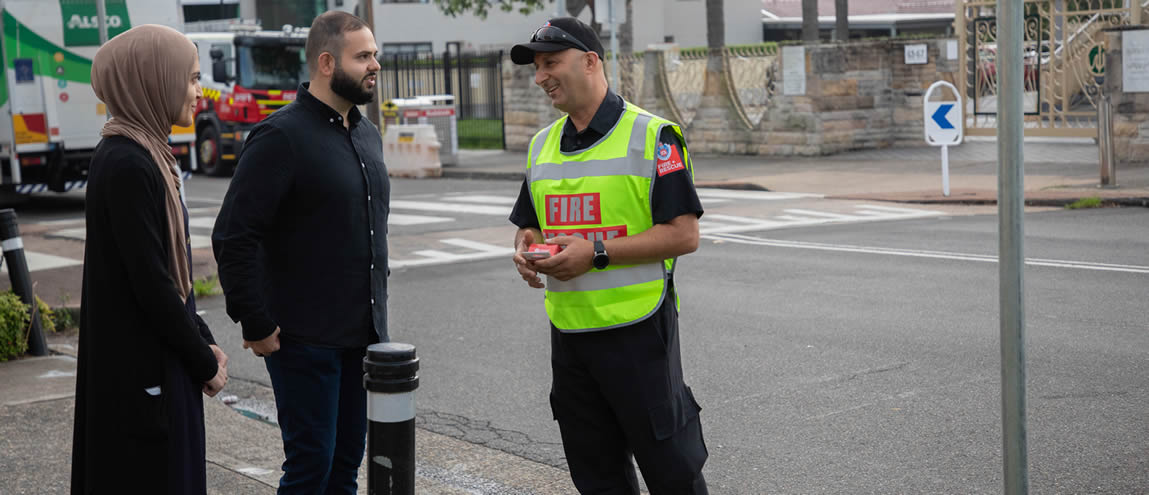Culturally and Linguistically Diverse (CALD) Communities Program
Nearly a third of New South Wales residents were born overseas (27.6%) and 1,878,653 have a first language other than English. More than 275 different languages are spoken, and 144 religions are practised in our State.
In line with NSW Government policy, Fire and Rescue New South Wales (FRNSW) recognises the importance of cohesion and social harmony and is committed to connecting with culturally and linguistically diverse (CaLD) communities to increase community education and safety across NSW.
Aim
The overall aim of the FRNSW CaLD program is to reduce the frequency and severity of fires and other emergencies in the homes of culturally and linguistically diverse community members.

Objectives
Our objectives are:
- To understand and address community need through listening, building relationships and collaboration
- To provide a structured approach using a range of programs and services to support firefighters in the important work of prevention and education within CaLD communities
- To provide FRNSW firefighters with the strategies and tools to engage in culturally aware, accurate and meaningful communication with CaLD communities represented in their local area
- To support increased preparedness and resilience in CaLD communities, particularly in relation to fire safety.
Target groups
Australia’s CaLD communities may be a particularly vulnerable part of Australian society in the context of emergencies. Many variables may contribute to this vulnerability. For example, people may not be confident to access emergency services if their English is not proficient, or they may be more susceptible to hazards if they are newly arrived in an unfamiliar environment.
At FRNSW, we are committed to identifying and overcoming these barriers through culturally responsive services. We also recognise that many CaLD communities possess a range of experiences and skills in dealing with emergencies and demonstrate exceptional resilience.
Some groups that may benefit from the FRNSW CaLD program include:
- Newly settled residents who may be unaware of fire risks within NSW
- CaLD community members who have low English proficiency and reside in their own homes
- CaLD community members who may be more vulnerable to risk due to intersectional or diverse needs such as young people, aged people, or people living with a disability
- Specific locations that have been identified as having a disproportionately high or fast-growing number of CaLD residents.
Program delivery
FRNSW is committed to building meaningful and genuine relationships with our CaLD communities. We provide practical support by:
- Identifying needs in local communities, and planning strategies, activities and events that may assist in meeting those needs, particularly in relation to fire safety education
- Providing translation services through radio communications 24/7
- Providing multilingual fire safety information both in print, and through our FRNSW Community Language Scheme representatives
- Supporting community groups with referrals to other agencies and participating in multi-agency opportunities.
For more information, please contact the FRNSW Community Engagement Unit at [email protected]
